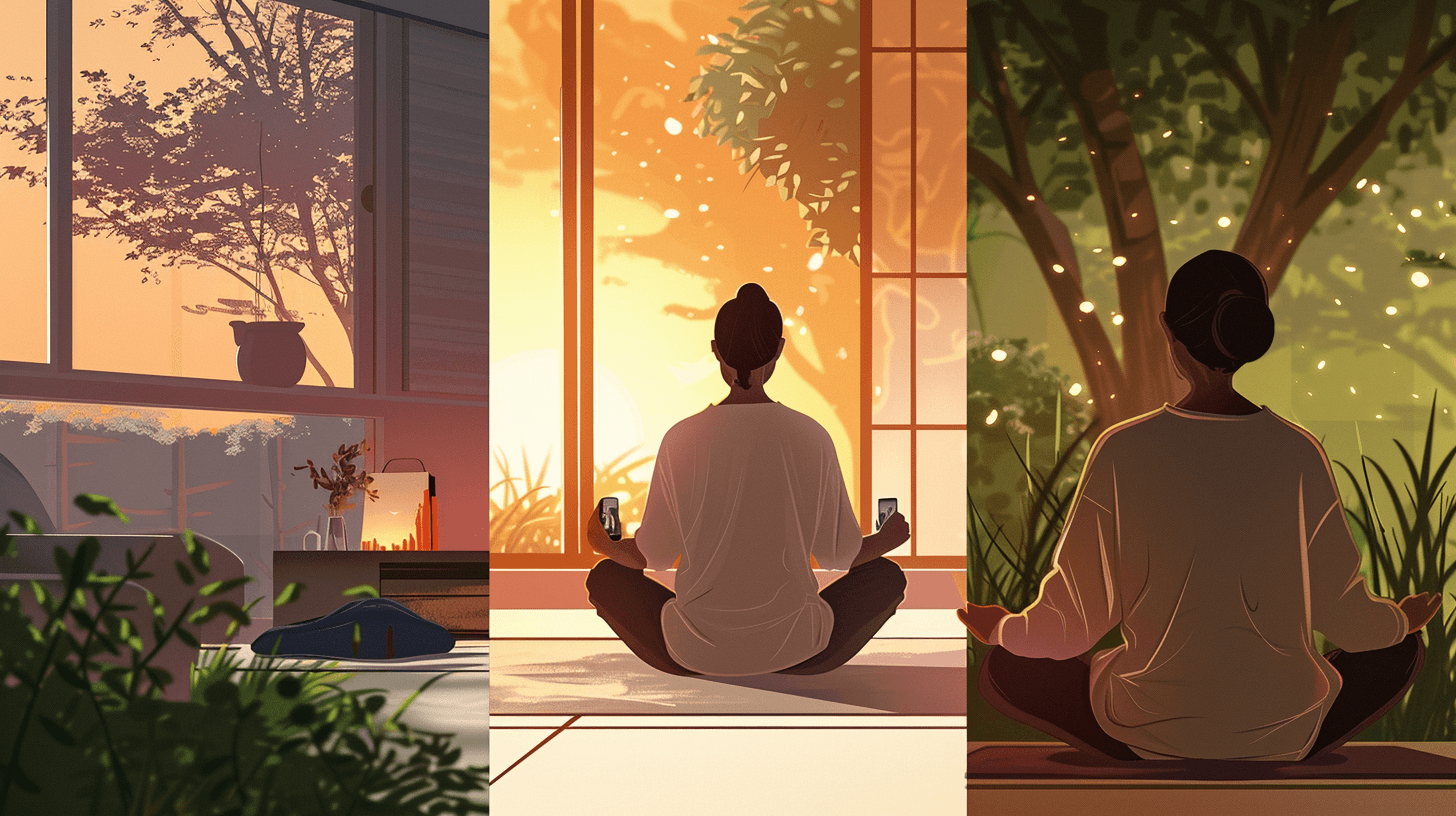Introduction: Why Guided Meditation is Essential for Relaxation

In today’s fast-paced world, where stress and anxiety have become almost ubiquitous, the quest for relaxation and inner peace is more crucial than ever. The digital age has amplified our daily pressures, bombarding us with constant notifications, demands, and distractions. As a result, many of us find ourselves trapped in a cycle of stress, struggling to unwind even in moments of supposed leisure. This is where guided meditation comes in, offering a powerful antidote to the chaos of modern life.
Guided meditation is more than just a relaxation technique; it’s a transformative practice that allows you to reconnect with your inner self, reduce stress, and foster a sense of calm that permeates every aspect of your life. Unlike other forms of relaxation that may offer only temporary relief, guided meditation empowers you to cultivate a lasting state of peace and mindfulness.
This article is designed to be your comprehensive guide to finding the best guided meditation books for relaxation. Whether you’re a beginner looking to start your meditation journey or an experienced practitioner seeking to deepen your practice, this guide will provide you with the tools, insights, and recommendations you need to achieve true relaxation. By the end of this article, you will not only understand the profound benefits of guided meditation but also have a clear path forward to integrate it into your daily life effectively.
Understanding the Search for Meaning

To truly appreciate the power of guided meditation, it’s essential to understand the science behind how meditation influences the body and mind. Stress activates the body’s fight-or-flight response, releasing hormones like cortisol and adrenaline, which prepare the body to deal with immediate threats. While this response is crucial in situations of real danger, chronic stress causes these hormones to flood the body regularly, leading to a host of negative health effects, including high blood pressure, weakened immune function, and mental health disorders such as anxiety and depression.
Meditation, particularly guided meditation, acts as a counterbalance to the stress response. Research has shown that meditation reduces the activity of the sympathetic nervous system—the system responsible for the fight-or-flight response—and increases the activity of the parasympathetic nervous system, which promotes relaxation and recovery. This shift in balance helps lower cortisol levels, reduce blood pressure, and improve heart rate variability, leading to a calmer, more relaxed state of being.
Moreover, meditation has been found to increase the production of serotonin and endorphins, neurotransmitters associated with feelings of happiness and well-being. Through regular practice, guided meditation can rewire the brain, promoting neuroplasticity and enhancing the brain’s ability to manage stress, focus, and maintain emotional stability.
What is Guided Meditation?
Guided meditation is a practice where a teacher or narrator leads you through the meditation process, often using visualizations, affirmations, and breathing techniques to help you relax and focus your mind. Unlike unguided meditation, where practitioners meditate in silence or with minimal guidance, guided meditation provides a structured approach that is particularly helpful for beginners or those who struggle with maintaining focus during meditation.
In a typical guided meditation session, the guide may ask you to visualize a peaceful scene, such as a beach or forest, and focus on the sights, sounds, and sensations of that environment. They may also lead you through breathing exercises, body scans, or mindfulness practices that help you become more aware of the present moment. The goal is to direct your attention away from the distractions and stresses of daily life and toward a state of inner calm and relaxation.
Guided meditation is effective because it engages multiple senses and provides a clear, focused path for the mind to follow. This structure makes it easier to achieve and maintain a meditative state, even for those who are new to meditation or find it difficult to quiet their minds.
Why Choose Guided Meditation for Relaxation?
The choice to engage in guided meditation for relaxation is driven by several key advantages that set it apart from other relaxation techniques:
Accessibility: Guided meditation is highly accessible, requiring no special equipment or prior experience. All you need is a comfortable place to sit or lie down, and you can begin your practice immediately.
Structured Guidance: The presence of a guide helps you stay focused and reduces the likelihood of your mind wandering. This structure is particularly beneficial for beginners who may find it challenging to meditate on their own.
Variety of Techniques: Guided meditation can incorporate a wide range of techniques, including mindfulness, visualization, deep breathing, and progressive muscle relaxation. This variety allows you to explore different methods and find the ones that work best for you.
Immediate Stress Relief: Guided meditation is designed to induce relaxation quickly, making it an effective tool for immediate stress relief. Whether you have five minutes or an hour, you can find a guided meditation that fits your schedule and helps you relax.
Long-Term Benefits: While guided meditation offers immediate relief, regular practice can lead to long-term improvements in mental and emotional well-being. Over time, you may find that you are better able to manage stress, maintain focus, and approach life with a greater sense of calm and clarity.
Guided meditation is not just a temporary escape from stress; it is a transformative practice that can change the way you respond to life’s challenges. By incorporating guided meditation into your daily routine, you can cultivate a deep, enduring sense of relaxation that enhances every aspect of your life.
Top Guided Meditation Books for Relaxation

In this section, we will explore some of the best guided meditation books available today. These books have been carefully selected based on their effectiveness, accessibility, and the depth of guidance they provide. Whether you are new to meditation or looking to deepen your practice, these books offer valuable insights and practical techniques to help you achieve relaxation and inner peace.
“The Miracle of Mindfulness” by Thich Nhat Hanh
Summary: Thich Nhat Hanh, a Vietnamese Zen master and peace activist, is one of the most influential spiritual leaders of our time. In “The Miracle of Mindfulness,” he introduces readers to the practice of mindfulness as a way to cultivate inner peace and relaxation. The book emphasizes the importance of being fully present in each moment, whether you are washing dishes, walking, or simply breathing.
Key Features:
Mindful Exercises: The book includes a variety of mindfulness exercises designed to help readers cultivate awareness and relaxation in their daily lives.
Simple Language: Thich Nhat Hanh’s writing is clear, concise, and accessible, making it easy for readers of all levels to understand and apply his teachings.
Holistic Approach: The book encourages readers to integrate mindfulness into every aspect of their lives, from daily tasks to interactions with others.
Why It’s Essential: “The Miracle of Mindfulness” is essential for anyone looking to integrate mindfulness into their daily routine as a path to relaxation and mental clarity. Thich Nhat Hanh’s gentle guidance helps readers develop a deeper connection to the present moment, leading to a sustained sense of calm and well-being.
“Meditation for Relaxation: Guided Practices to Calm Your Mind and Body” by Adam Z. Robinson
Summary: Adam Z. Robinson’s “Meditation for Relaxation” is a practical guide specifically focused on helping readers achieve relaxation through guided meditation. The book offers a variety of guided meditation practices designed to calm the mind, reduce stress, and promote physical relaxation.
Key Features:
Guided Sessions: The book provides structured meditation sessions that are easy to follow, making it ideal for beginners.
Focus on Relaxation: Each meditation is designed with relaxation in mind, offering techniques that help readers release tension and find peace.
Audio Resources: The book includes access to audio recordings of the guided meditations, allowing readers to practice with ease.
Why It’s Essential: “Meditation for Relaxation” is perfect for readers who want a straightforward, no-nonsense guide to achieving relaxation through meditation. Its practical approach and clear instructions make it an invaluable resource for anyone looking to incorporate meditation into their daily routine.
“Calm: Calm the Mind, Change the World” by Michael Acton Smith
Summary: “Calm” by Michael Acton Smith is more than just a book—it’s a multimedia experience designed to help readers find peace and relaxation in their daily lives. The book combines guided meditation with other relaxation techniques, including mindfulness, breathing exercises, and journaling.
Key Features:
Interactive Elements: The book includes space for readers to write down their thoughts and reflections, making it a more engaging and interactive experience.
Digital Resources: “Calm” is accompanied by an app that offers additional guided meditation sessions, calming music, and nature sounds.
Visual Appeal: The book is beautifully designed with soothing images and colors that enhance the reading experience.
Why It’s Essential: “Calm” is ideal for readers who prefer a multimedia approach to relaxation. The combination of guided meditation, mindfulness exercises, and interactive elements makes it a comprehensive tool for achieving and maintaining calm in a busy world.
“Wherever You Go, There You Are” by Jon Kabat-Zinn
Summary: Jon Kabat-Zinn, the creator of the Mindfulness-Based Stress Reduction (MBSR) program, is a pioneer in bringing mindfulness to mainstream audiences. In “Wherever You Go, There You Are,” he offers readers a practical guide to integrating mindfulness into their everyday lives. The book emphasizes the importance of being present and fully engaged in each moment, no matter where you are or what you are doing.
Key Features:
Practical Advice: Kabat-Zinn provides readers with simple, practical tips for practicing mindfulness in daily life.
Real-Life Applications: The book explores how mindfulness can be applied to various aspects of life, from work to relationships to personal growth.
In-Depth Exploration: While accessible to beginners, the book also offers deeper insights for those looking to deepen their mindfulness practice.
Why It’s Essential: “Wherever You Go, There You Are” is a must-read for anyone interested in using mindfulness as a tool for relaxation and stress reduction. Kabat-Zinn’s teachings are both profound and practical, making this book a valuable resource for readers at any stage of their mindfulness journey.
“Relaxation Revolution: Enhancing Your Personal Health Through the Science and Genetics of Mind Body Healing” by Herbert Benson
Summary: Herbert Benson, a pioneer in mind-body medicine, explores the science of relaxation in “Relaxation Revolution.” The book delves into the genetic and physiological effects of relaxation techniques, offering evidence-based practices for reducing stress and improving overall health.
Key Features:
Scientific Foundation: Benson’s book is grounded in scientific research, making it appealing to readers who appreciate a more analytical approach to relaxation.
Guided Exercises: The book includes guided meditation exercises that are specifically designed to activate the relaxation response and promote healing.
Health Benefits: Benson explores the health benefits of relaxation, including its impact on chronic conditions such as hypertension and anxiety.
Why It’s Essential: “Relaxation Revolution” is an essential read for those who want a scientifically grounded approach to relaxation through meditation. Benson’s research-backed techniques offer readers a reliable and effective way to manage stress and improve their health.
How to Choose the Right Guided Meditation Book for Your Needs

Choosing the right guided meditation book is crucial to ensuring that your practice is both effective and enjoyable. With so many options available, it’s important to consider your unique needs, preferences, and goals when selecting a book.
Assessing Your Current Stress Levels
Before choosing a guided meditation book, it’s helpful to assess your current stress levels and emotional state. Are you dealing with chronic stress, anxiety, or burnout? Or are you simply looking for a way to unwind at the end of the day? Understanding your specific needs will help you choose a book that offers the right level of guidance and support.
High Stress Levels: If you’re experiencing high levels of stress or anxiety, consider a book that offers structured, easy-to-follow sessions designed to calm the mind and body. Books like “Meditation for Relaxation” by Adam Z. Robinson provide practical techniques for immediate stress relief.
Moderate Stress Levels: If your stress levels are moderate and you’re looking to deepen your relaxation practice, a book that combines meditation with mindfulness, such as “The Miracle of Mindfulness” by Thich Nhat Hanh, might be more suitable.
Low Stress Levels: If you’re relatively relaxed but want to incorporate meditation into your daily routine for overall well-being, a book like “Wherever You Go, There You Are” by Jon Kabat-Zinn can help you integrate mindfulness into every aspect of your life.
Identifying Your Preferred Learning Style
People have different learning styles, and choosing a book that aligns with your preferred way of learning can enhance your meditation experience. Consider whether you prefer reading text, listening to audio, or engaging with interactive elements when selecting a guided meditation book.
Text-Only: If you prefer reading and reflecting on your own, books like “The Miracle of Mindfulness” and “Wherever You Go, There You Are” offer detailed guidance and exercises that you can practice independently.
Audio-Guided: If you find it easier to meditate with audio guidance, look for books that include access to audio recordings, such as “Meditation for Relaxation.” Audio guides can be particularly helpful for beginners or those who struggle with maintaining focus during meditation.
Interactive: If you enjoy a more hands-on approach, consider a book that includes interactive elements, such as journaling prompts or digital resources. “Calm” by Michael Acton Smith offers a multimedia experience that engages multiple senses and keeps you actively involved in the relaxation process.
Considering the Author’s Approach
The approach and background of the author can significantly influence the style and content of a guided meditation book. Some authors focus on spiritual or religious perspectives, while others take a more secular or scientific approach. Understanding the author’s perspective can help you choose a book that resonates with your beliefs and preferences.
Spiritual Approach: If you’re looking for a book with a spiritual foundation, consider “The Miracle of Mindfulness” by Thich Nhat Hanh, which draws on Zen Buddhist principles.
Secular Approach: For a more secular, research-based approach, “Relaxation Revolution” by Herbert Benson offers scientifically grounded techniques for stress reduction.
Blended Approach: If you’re open to a combination of spiritual and secular teachings, “Wherever You Go, There You Are” by Jon Kabat-Zinn integrates mindfulness practices with insights from both Eastern and Western traditions.
Looking for Practicality and Accessibility
Finally, it’s important to choose a book that offers practical, easy-to-follow instructions that can be easily integrated into your daily life. Consider the following factors when assessing a book’s practicality:
Ease of Use: Look for books that provide clear, step-by-step instructions for each meditation session. Books like “Meditation for Relaxation” are designed to be straightforward and accessible, making them ideal for beginners.
Time Commitment: Consider how much time you can realistically dedicate to meditation each day. Some books offer short, five-minute sessions that can be easily incorporated into a busy schedule, while others provide longer, more in-depth practices.
Additional Resources: Check if the book includes any additional resources, such as audio recordings, digital downloads, or companion apps. These resources can enhance your meditation experience and provide additional support as you develop your practice.
Maximizing the Benefits of Guided Meditation for Relaxation

Guided meditation offers numerous benefits, but to fully reap these rewards, it’s important to approach your practice with intention and consistency. In this section, we’ll explore how to maximize the benefits of guided meditation by creating a relaxation routine, enhancing your practice with mindfulness, incorporating relaxation techniques into daily life, and overcoming common challenges.
Creating a Relaxation Routine
One of the most effective ways to integrate guided meditation into your life is by establishing a regular relaxation routine. Consistency is key to achieving long-term benefits, as it helps reinforce the habits and practices that promote relaxation.
Set a Regular Time: Choose a specific time each day for your meditation practice. Whether it’s first thing in the morning, during your lunch break, or before bed, setting a regular time helps make meditation a non-negotiable part of your routine.
Create a Dedicated Space: Designate a quiet, comfortable space in your home for meditation. This could be a corner of your bedroom, a cozy chair in your living room, or even a spot in your garden. Make sure the space is free from distractions and conducive to relaxation.
Establish Rituals: Incorporate rituals that signal the beginning of your meditation session. This could include lighting a candle, playing calming music, or practicing deep breathing exercises. These rituals help create a sense of calm and prepare your mind and body for meditation.
Enhancing Your Meditation Practice with Mindfulness
Mindfulness is a powerful complement to guided meditation, as it encourages you to stay fully present and engaged during your practice. By integrating mindfulness into your meditation sessions, you can deepen your relaxation experience and cultivate a greater sense of awareness.
Focus on the Breath: One of the simplest ways to practice mindfulness during meditation is by focusing on your breath. Pay attention to the sensation of the air entering and leaving your body, and gently bring your focus back to your breath whenever your mind begins to wander.
Body Scan Technique: The body scan is a mindfulness exercise that involves paying attention to the sensations in different parts of your body. Starting from the top of your head and working your way down to your toes, mentally scan each part of your body, noticing any tension or discomfort and releasing it with each exhale.
Mindful Observation: During your guided meditation, take a moment to observe your thoughts and emotions without judgment. Acknowledge them, and then let them go, bringing your focus back to the present moment. This practice helps you develop a non-reactive awareness that can enhance your relaxation and well-being.
Incorporating Relaxation Techniques into Daily Life
While guided meditation is a powerful tool for relaxation, the benefits can be extended beyond your meditation sessions by incorporating relaxation techniques into your daily life. By practicing mindfulness and relaxation throughout the day, you can maintain a sense of calm and balance even in the midst of stress.
Mindful Breathing: Whenever you feel stressed or overwhelmed, take a moment to practice mindful breathing. Inhale deeply through your nose, hold for a few seconds, and then exhale slowly through your mouth. This simple technique can help calm your nervous system and reduce stress in the moment.
Short Meditation Breaks: If you have a few minutes to spare during the day, take a short meditation break. Close your eyes, focus on your breath, and let go of any tension or worries. Even a brief meditation session can help you reset and refocus.
Guided Meditation Apps: Use guided meditation apps like Calm or Headspace to access short, on-the-go meditation sessions. These apps offer a variety of guided meditations that you can practice during your commute, at work, or before bed.
Overcoming Common Challenges in Meditation
Starting a meditation practice can be challenging, especially if you’re new to the practice or dealing with high levels of stress. However, by addressing common obstacles and approaching meditation with patience and self-compassion, you can overcome these challenges and enjoy the full benefits of guided meditation.
Restlessness: It’s normal to feel restless or fidgety during meditation, especially if you’re not used to sitting still for extended periods. To combat restlessness, start with shorter sessions and gradually increase the length as you become more comfortable. You can also try different meditation postures, such as sitting in a chair or lying down, to find a position that feels more comfortable.
Distraction: Distraction is a common challenge in meditation, particularly in the beginning. If you find your mind wandering during your session, gently acknowledge the distraction and bring your focus back to your breath or the guide’s voice. Remember, it’s normal for the mind to wander, and the practice of bringing it back is an essential part of meditation.
Impatience: Meditation is a practice that requires patience and consistency. If you’re feeling impatient or frustrated with your progress, remind yourself that meditation is not about achieving perfection but about being present and cultivating self-awareness. Celebrate small victories, such as completing a session or noticing a moment of calm, and trust that the benefits will come with time.
Additional Resources for Deepening Your Relaxation Practice

As you continue to explore guided meditation, you may find it helpful to access additional resources that can enhance your practice and provide further support. In this section, we’ll recommend books, apps, courses, and tools that can help you deepen your relaxation practice and maintain a sense of calm in your daily life.
Further Book Recommendations
If you’re eager to expand your meditation library, consider exploring the following books, which offer additional guidance and techniques for relaxation and stress reduction:
“10% Happier” by Dan Harris: A candid, humorous guide to meditation and mindfulness, written by a news anchor who discovered the transformative power of meditation after a panic attack on live TV.
“The Relaxation Response” by Herbert Benson: Another classic from Herbert Benson, this book explores the science behind the relaxation response and provides practical techniques for reducing stress and improving health.
“Radical Acceptance” by Tara Brach: This book combines mindfulness and self-compassion practices to help readers embrace their imperfections and cultivate a sense of inner peace and acceptance.
Guided Meditation Apps
For those who prefer digital resources, guided meditation apps offer a convenient way to access meditation sessions anytime, anywhere. Here are some popular apps to consider:
Calm: Known for its soothing music, nature sounds, and guided meditation sessions, Calm is an excellent app for relaxation and stress relief.
Headspace: Headspace offers a wide range of guided meditations, including sessions specifically designed for relaxation, stress management, and sleep improvement.
Insight Timer: This app features a vast library of guided meditations from teachers around the world, as well as customizable timers and ambient sounds for a personalized meditation experience.
Online Courses and Workshops
If you’re interested in deepening your meditation practice through structured learning, consider enrolling in an online course or workshop. Here are some options to explore:
Mindfulness-Based Stress Reduction (MBSR) Course: Developed by Jon Kabat-Zinn, the MBSR program is a comprehensive course that teaches mindfulness meditation techniques for stress reduction and overall well-being.
The Science of Well-Being by Yale University: Available on Coursera, this course explores the psychology of happiness and offers practical strategies for improving well-being, including mindfulness and meditation practices.
Meditation and Mindfulness Workshops: Many meditation centers and wellness organizations offer virtual workshops on various aspects of meditation, including relaxation techniques, mindfulness, and self-compassion.
Meditation Tools and Accessories
Finally, consider investing in tools and accessories that can enhance your meditation experience and create a more comfortable and supportive environment for relaxation:
Meditation Cushions: A comfortable meditation cushion can help you maintain proper posture and stay focused during your meditation sessions.
Aromatherapy: Essential oils like lavender, chamomile, and eucalyptus can create a calming atmosphere and enhance your relaxation practice.
Calming Music: Soft, ambient music or nature sounds can help you relax and set the mood for meditation. Consider creating a playlist or using a streaming service that offers meditation music.
Conclusion: Embracing Guided Meditation as a Path to Relaxation

Guided meditation is a powerful and accessible tool for achieving relaxation and inner peace. Whether you’re dealing with chronic stress, seeking a way to unwind at the end of the day, or simply looking to deepen your mindfulness practice, guided meditation offers a structured and effective approach to calming the mind and body.
The books and resources recommended in this article provide a wealth of guidance and support for anyone looking to integrate guided meditation into their daily life. By choosing the right book, establishing a consistent practice, and incorporating relaxation techniques into your routine, you can cultivate a lasting sense of calm and well-being.
Remember, the journey to relaxation is not about perfection but about progress. Be patient with yourself, embrace the practice with an open heart, and trust that the benefits of guided meditation will unfold over time. As you continue to explore this transformative practice, you’ll discover that relaxation is not just a state of mind but a way of being that can enhance every aspect of your life.







